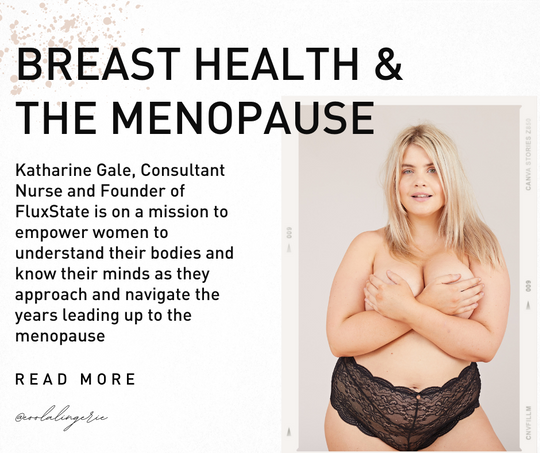The Menopause & Your Breast Health


It’s getting hot in here
Katharine Gale, Consultant Nurse and Founder of FluxState is on a mission to empower women to understand their bodies and know their minds as they approach and navigate the years leading up to the menopause.
Not all women will experience Hot Flushes
The average age of the menopause is 51 but one in 100 women will go through the menopause before they are forty and therefore its important all women are aware of the potential signs and symptoms associated with the fluctuations in hormones. The perimenopause is the period of time before the menopause when menstrual periods stop forever. It’s the peri menopausal years that are more likely to be associated with symptoms such as irregular periods, mood swings, anxiety and low mood. Not all women will experience hot flushes and night sweats and many women don’t associate their other symptoms with the peri menopause.
Could it be the perimenopause?
Eight years ago, aged just forty Katharine walked out on her job due to all consuming anxiety, insomnia, fatigue and mood swings. She thought it was due to being a new mum and the stress of her job. Its wasn’t until three years later when she started experiencing hot flushes that she herself joined up the dots and worked out she was perimenopausal.

“Imagine a world where, instead of breaking us, menopause is the making of us. That is the world I am working to create”. Katharine Gale – Founder of FluxState
Katharine now has a community of over 2,000 women in her private facebook group where she is educating women about their bodies and the signs of menopause. As a nurse with nearly three decades experience in women’s health, Katharine uses her clinical expertise and her coaching to support women to consider all their options then empowering them to ask for what they need to manage their symptoms and improve their health and wellbeing.
Breast soreness is one of the 34 signs and symptoms of the peri menopause

Fluctuating hormones are the cause of cyclical breast soreness, which usually corresponds with your menstrual period. Its more common for women to experience breast soreness leading up to the menopause compared to the years after their periods stop. Women may report a dull, heavy or aching pain in the breast tissue, which begins up to two weeks before a period and gets worse before it goes away when the period finishes. Women usually describe it as affecting both breasts and sometimes the pain spreads to the armpit. Breast pain can be worse after starting hormonal medication but usually settles down with time. If it doesn’t settle its important to discuss with a health care professional
Top Tip: make sure you are wearing a well-fitting bra and recheck your size and the fit every 6 months
Katharine shares other tips including reducing alcohol and caffeine intake. There is little evidence that evening primrose oil helps with breast soreness but there are a few studies that show when used on its own or with vitamin E it can improve breast pain in some women.
Being breast aware
Breast cancer is the most common cancer for women in the UK. One in seven women will get cancer at some point in their life. So be breast aware and check your breasts regularly and report any of the following to a health care professional:
A new lump or thickening of the breast or armpit
A change in size, shape or feel of the breast
Skin changes in the breast such as puckering, dimpling, a rash or redness of the skin
Fluid leaking from the nipple and not pregnant or breast feeding
Change in the position of the nipple
For more information on Coaching, Courses and Consulting check out Katharine’s FluxState webpage www.fluxstate.co.uk and her private Facebook group https://www.facebook.com/groups/2505036666469018/

